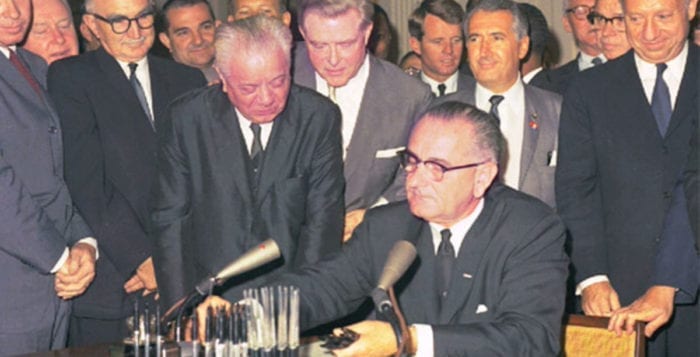By Leah Dunaief

Before February’s Black History Month moves away for another year, I would like to share with you the exciting story I read in Doris Kearns Goodwin’s book, “Leadership: In Turbulent Times,” with lessons from four presidents as leaders: Abraham Lincoln, Theodore Roosevelt, Franklin D. Roosevelt and Lyndon B. Johnson. Now you might be thinking that’s not the sexiest subject to be writing or reading about, but in her storytelling hands, it is a page turner.
We all know too well that Johnson, the Democratic vice president, became president when John F. Kennedy was assassinated on Nov. 22, 1963. At that time, Kennedy’s progressive legislation was totally bogged down in Congress, going nowhere. What might not be so well known is that LBJ, as he was fondly known, was a “master mechanic” of the legislative process for he had come of age in politics in Congress. “It was his fierce resolve not simply to dislodge Kennedy’s stalled agenda but to realize a society built on racial and economic justice far beyond the [FDR’s] New Deal and [Kennedy’s] New Frontier,” Goodwin wrote.
Taking advantage of the short burst of sympathy and support that he expected to realize from the nation, Johnson, a Texan, wanted to get the contentious civil rights bill, designed to end segregation in the South, enacted. “We have talked long enough in this country about equal rights. We have talked for 100 years or more. It is time now to write the next chapter, and to write it in the books of law,” he told Congress in his address to the nation on Nov. 27, 1963.
But first he needed some congressional momentum to oil the rails and cleverly called for Kennedy’s tax cut to pass. Less divisive than the issue of civil rights, the bill had passed in the House after 13 months but was opposed by Virginia Sen. Harry Byrd, a conservative Democrat and chairman of the Senate Finance Committee. Conservatives then adamantly believed in a balanced budget. The idea of tax cuts came from liberals.
Johnson was able to work out a deal with Byrd. If he could get the proposed budget down below $100 billion in 1965, Byrd would bring the bill to the floor for a vote. With great effort, Johnson did, the bill was voted on and the Revenue Act of 1964 was passed into law on Feb. 26, barely three short months after the assassination.
Now came the bigger challenge: civil rights.
Once the tax cut bill passed, promising more revenue from increased business that could be spent on social services, Lyndon Johnson focused his
attention and his legislative expertise on securing the mandate of law for civil rights.
To say the least, Southern Congressional Republicans, many of them Johnson’s friends, adamantly opposed his effort. He liked to tell them his personal story about his longtime black employees, his housemaid and butler, Helen and Gene Williams, and his cook, Zephyr Wright.
Each year Johnson asked them to drive his extra car from Washington, D.C., back to Texas, a three-day journey. One year Johnson asked Gene to take along his affectionate beagle as well. It was then that Johnson learned how difficult such a trip was for those of color: almost no places on the road to stop and eat, almost no bathrooms in which they were allowed, few places to sleep. “A colored man’s got enough trouble getting across the South on his own, without having a dog along,” Gene explained. Now, all these years later, the winner of the best picture at Sunday’s Academy Awards, “Green Book,” tells us the same story about traveling through the South in the 1960s with its unjust system of segregation.
Johnson knew his passionate advocacy for this bill would separate him from the South and from his Southern friends and colleagues.
Johnson confronted those in Congress with how wrong segregation was and tirelessly worked the legislative system for passage of his bill. He challenged Virginia’s defiant Judge Howard Smith, a Democratic congressman and chair of the House Rules Committee by resorting to the discharge petition, a rarely used procedure, to blast the bill out of committee with the help of a majority of representatives. He rallied those outside the House to pressure their elected representatives to free the bill. The strategy worked, as leaders all over the country organized to do just that.
Once out of committee, the House passed the strongest civil rights bill since Reconstruction.
Next came the Senate. Johnson took on Richard Russell (D-Georgia), Senate leader of the Southern opposition, in a pitched battle that proved history is the result of individuals in the right place at the right time. Only a son of the South could have persevered at that juncture. Johnson managed, with the help of Republicans, and especially Senate minority leader, Everett Dirksen (R-Illinois), to break the Southern-led Senate filibuster. The bill then passed in the Senate.
On July 2, Johnson signed the Civil Rights Act of 1964 into law. He ended by saying, “To the extent Negroes were free, really free, so was I. And so was my country.”





